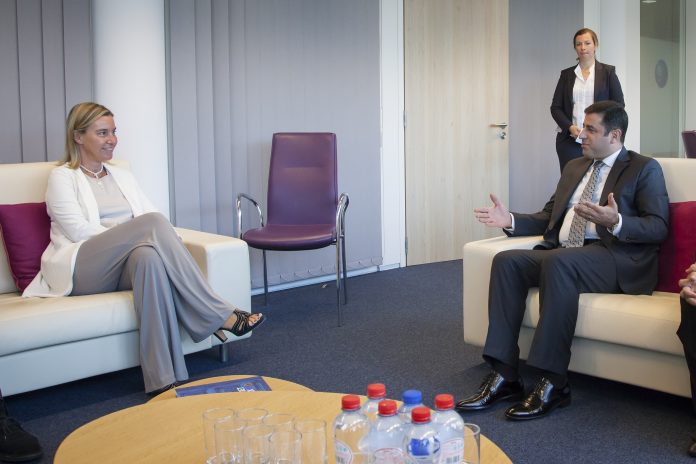Turkey has been going through a catastrophic period since the launch in December 2013 of a corruption probe into President Erdogan’s family and members of his cabinet for receiving bribes from an Iranian-Turkish gold trader, Reza Zarrab. Erdogan’s blatant obstruction of the probe transformed the judiciary into an extension of the government rather than an independent body and has started to spread instability in the region and in Europe, where Erdogan’s henchmen pursue those who seek refuge from his government. Erdogan openly expressed his contempt for the rule of law on his latest visit to Greece, where he recommended that the government not leave the extradition of Turkish asylum seekers to the judiciary.
To avoid being impeached, Erdogan formed an alliance with Turkey’s notorious ultranationalists, who have deep roots within the state apparatus including the army and judiciary. In a Machiavellian move, the government had Brunson, an American pastor working in Turkey for 23 years, arrested for links with an alleged terror organization. Although no evidence was prevented when Brunson was charged, Erdogan has now offered America a “swap” – the pastor for Reza Zarrab, the prime suspect in the 2013 corruption probe. Since being arrested at Miami International Airport in March 2016 on charges of evading US sanctions on Iran, Zarrab has admitted the bribery offences .
Erdogan does not hesitate to punish opponents by means of the judiciary. Amnesty Turkey’s chair Taner Kılıç and well-known philanthropist Osman Kavala are now in jail. Murat Arslan, head of the now dissolved Association of Judges and Prosecutors, has been in jail since October 2016; PACE awarded him the Havel Vaclav Human Rights Prize in 2017. Selahattin Demirtas, leader of Turkey’s third biggest party, and dozens of members of his party are in jail. Recently, an arrest warrant was issued for Aykan Erdemir, a former opposition MP who is currently in the US, and his assets have been confiscated.
Erdogan and the ultranationalists are the two major players currently manipulating the judiciary. To eliminate their opponents, mainly pro-Western bureaucrats and civil society actors, this alliance first introduced ‘Criminal Peace Justices’ – designed as a kind of ‘closed circuit’ structure to decide arrest and confiscation issues. The justices began their duties in July 2014. Events and public statements by Erdogan indicate that these courts have been created, staffed and instructed by the executive. Legal experts and international bodies such as the Venice Commission criticize them for violating the principles of natural justice.
The biggest attack on the judiciary came the day after the coup attempt of July 15, 2016: arrest warrants were issued for 2,745 judges and prosecutors. Nearly 5000 judges have been dismissed and almost 2500 of them are still in jail, including hundreds of members of the Supreme Court and the Constitutional Court. Judges who have ruled against the government are relocated against their wishes, dismissed, or jailed. Huseyin Aygun, a former lawmaker and lawyer, says that 680 judges have been held in solitary confinement with no legal reasoning. Ahmet Turan Alkan, a journalist, said in his hearing after 500 days of pre-trial detention that he and the judges suffer the same oppression and so they cannot rule for his release.
The State of Emergency declared after the coup is a pretext for purging dissidents. Erdogan is particularly targeting the Gülen Movement, accusing it of masterminding the coup. Parliament was not permitted to conduct a thorough investigation of the coup attempt and journalists, like Ahmet Şık, who question Erdogan’s coup narrative are silenced. Under the State of Emergency, over 150,000 public servants were dismissed, including Gülenists, idealist bureaucrats, leftists, and Kurdish dissidents. Dismissed public servants are condemned to ‘civil death’ by banning their employment in the private sector and cancelling their passports. Emergency decrees have become a means of imperial rule.
International rights groups like Human Rights Watch, Amnesty International and Platform for Peace and Justice say that dissidents in Turkey are subjected to torture and kidnapping, and the decree allowing detention without charge for 30 days violates all relevant conventions. Nearly 60 detainees have committed suicide; many claim those were extrajudicial killings. The Turkish secret service has kidnapped and tortured more than a dozen people. Families of victims have identified individuals and cars involved in these disappearances, but the authorities refuse to investigate. The kidnappings and torture in Kurdish cities which characterized the 1990s have returned. Government forces have also destroyed the homes of hundreds of thousands of Kurdish citizens in the ‘fight against terror.’
Emergency decrees restrict access to a lawyer and to files related to the alleged crime. People in detention are not informed of the grounds for their arrest. Nearly 700 lawyers have been arrested and double that number prosecuted. In the atmosphere of fear, many lawyers will not defend dissidents.
Those who lose their jobs cannot pursue their rights because legal remedies are blocked by emergency decrees. The European Court of Human Rights has disappointed victims by returning nearly 30,000 files, referring them to a sham commission incapable of providing recourse. The Court has not yet responded to any of thousands of applications about arbitrary detention. The Court is now rumoured to be negotiating with the Turkish judiciary and government to rid itself of this workload. Victims of the Turkish witch hunt are being consigned to civil death by both the Turkish courts and the ECHR.
As a result of the lack of opportunity to pursue their rights in Turkey and before the ECHR, Turkish citizens are fleeing to Europe. Thousands have fled via Greece to European countries, seeking asylum. If the arbitrary and grave human rights violations do not cease in the near future, Turkey will become another Syria, spreading instability in the Middle East and Europe.
Dr Ugur Tok is the Director of Platform for Peace and Justice in Brussels, http://www.

